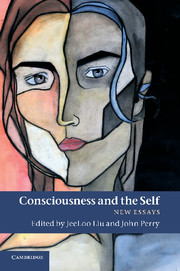Book contents
- Frontmatter
- Contents
- Acknowledgments
- Contributors
- Introduction
- Chapter 1 Awareness and identification of self
- Chapter 2 Self-representationalism and the explanatory gap
- Chapter 3 Thinking about the self
- Chapter 4 Ordinary self-consciousness
- Chapter 5 Waiting for the self
- Chapter 6 I think I think, therefore I am – I think
- Chapter 7 Knowing what I want
- Chapter 8 Self-ignorance
- Chapter 9 Personhood and consciousness
- Chapter 10 My non-narrative, non-forensic Dasein
- References
- Index
- References
Chapter 3 - Thinking about the self
Published online by Cambridge University Press: 05 December 2011
- Frontmatter
- Contents
- Acknowledgments
- Contributors
- Introduction
- Chapter 1 Awareness and identification of self
- Chapter 2 Self-representationalism and the explanatory gap
- Chapter 3 Thinking about the self
- Chapter 4 Ordinary self-consciousness
- Chapter 5 Waiting for the self
- Chapter 6 I think I think, therefore I am – I think
- Chapter 7 Knowing what I want
- Chapter 8 Self-ignorance
- Chapter 9 Personhood and consciousness
- Chapter 10 My non-narrative, non-forensic Dasein
- References
- Index
- References
Summary
Introduction
Suppose that when Bill Clinton moved to the White House he was unaware that the Secret Service used the acronym “POTUS” to refer to the president. In his morning briefing summary he sees the sentence “POTUS meets with the Queen of England at noon.” This upsets him. Who is POTUS? Why is this person meeting with the Queen, instead of Clinton? He says to Hillary, “POTUS is meeting with the Queen; who in the world is POTUS, and why is he meeting with the Queen instead of me?” It seems that the person Clinton is asking about is Clinton himself; the right answer for Hillary to give is, “You are POTUS.” Clinton said something about himself, without realizing it. And, indeed, it seems that Clinton believed something about himself, without realizing it. I will say that Clinton had a belief that was merely about the person he happened to be. This is a self-belief, in that the truth-conditions of the belief impose conditions on the believer. But it is not what we would normally call having a belief about oneself.
It seems then, that we can make a distinction between saying something about yourself in the sense in which that merely said something about the person you happen to be, and saying something about yourself in the sense of making what we might call a “self-assertion,” which implies not only that the person you referred to was you, but also that you knew this and intended to convey it. Use of the word ‘I’ indicates that one is self-asserting. And an analogous distinction may be made at the level of belief. We have the phrase “self-knowledge”; I will supplement it with the phrase “self-belief.” Clinton had a belief about the person he happened to be, but it was not a self-belief.
Keywords
- Type
- Chapter
- Information
- Consciousness and the SelfNew Essays, pp. 76 - 100Publisher: Cambridge University PressPrint publication year: 2011
References
- 2
- Cited by

